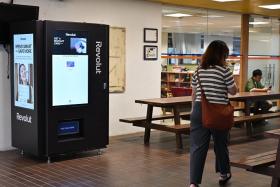Paying it forward: NUS students mentor and tutor children from low-income families
While many young people enjoy spending time off from university resting or relaxing with their friends, some 700 National University of Singapore (NUS) undergraduates have volunteered to become mentors to children from low-income families.
Teach Singapore (Teach SG), which was officially launched on Saturday (April 16), is a community initiative by NUS that offers academic tutoring and mentorship to primary and secondary school students from such families.
Speaking to the media at University Cultural Centre, one of the volunteers, Miss Celest Chiam, 21, said: "I recognise that as kids, we had a lot of opportunities to pursue our passions, let's say, dance or singing, which not every household has the privilege to pursue due to maybe financial limitations."
The medical student added: "I wanted to pay my experiences as a kid forward and ensure that financial circumstances are not a limitation to people pursuing their dreams."
Under the programme, each mentor can take on up to two children, or a pair of mentors takes on groups of three children.
Mentees are assigned following close collaboration with community partners including primary and secondary schools and social service agencies.
The mentors are trained to facilitate activities and games, as well as help their mentees academically during the two- to three-hour weekly sessions over at least 12 weeks.
Chemistry undergraduate Muhammad Rafiqi Leman said he signed up as a mentor so that he can also be a source of encouragement to the children.
"Ultimately, my aim is also to provide a safe space for students to share (with me) their feelings or emotions... In a sense, I journey with them to grow in their social and emotional development as well," said the 25-year-old.
He added that his mentees share with him issues they face, such as those concerning their family and how they struggle to find the motivation to go to school each morning.
Miss Chiam, whose mentees seek her advice on how to reach their academic goals, added: "When you see how the mentees reciprocate our efforts, (in) the little improvements throughout the sessions, and how they constantly ask us questions to clarify their doubts, the initiatives they put into their learning and their self-motivation, they really inspire us to put in more effort and time."
Get The New Paper on your phone with the free TNP app. Download from the Apple App Store or Google Play Store now


